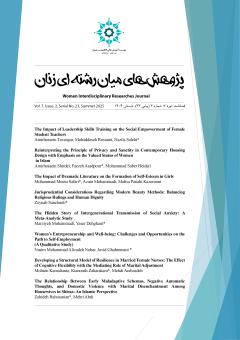The Impact of Leadership Skills Training on the Social Empowerment of Female Student Teachers
Subject Areas :Amirhossein Tavangar 1 , Mohadeseh Rostami 2 , Nazila Salehi 3
1 - Undergraduate Student in Elementary Education, Shahid Beheshti Farhangian University, Eqlid, Fars, Iran.
2 - Bachelor of Elementary Education Student, Zeinab Kobra University of Education, Kazerun, Iran.
3 - Ph.D. in Philosophy of Education, Lecturer at Zeinab Kobra Farhangian University, Kazeroon, Fars, Iran.
Keywords: : Leadership Skills, Female Student Teachers, Social Empowerment, Society.,
Abstract :
The aim of this study was to investigate the impact of leadership skills training on the social empowerment of female student teachers. This research was conducted using a survey method, and data were collected through a questionnaire consisting of two main sections: the first section assessed leadership skills (including communication skills, problem-solving, time management, and classroom management), while the second section evaluated social empowerment (including self-confidence, social participation, and role in decision-making processes). The statistical population consisted of 100 female student teachers from various universities, selected randomly.The findings indicated that leadership skills training had a positive and significant effect on the social empowerment of female student teachers. Specifically, communication and problem-solving skills were more strongly associated with increases in self-confidence and social participation. Additionally, time management and classroom management skills positively influenced their individual capabilities in decisionmaking and fulfilling social roles.Overall, this study highlights the importance of leadership skills training for female student teachers and recommends the integration of such training into teacher education programs.
1- اسلامی اکبر، رسول(1393). مهارتهای نوین در رهبری نظام آموزشی. یک مطالعات کتابخانهای. پانزدهمین همایش کشوری آموزش علوم پزشکی.
2- بابایی، طاهره؛ سلیمانی خویگانی، منوچهر؛ رنجبر امجد، الهام؛ و مختاری، سمانه(1399). تأثیر سبک رهبری بر جایگاه زنان در سازمانهای آموزشوپرورش. مجله مطالعات روانشناسی و علوم تربیتی، 4(18).
3- رجبی، عاطفه؛ و مهری، پرستو(1400). سبک رهبری زنان. چهارمین کنفرانس بینالمللی مطالعات بینرشتهای در مدیریت و مهندسی.
4- خلیلی، زهرا؛ و خلیلی، سعید(1401). توانمندسازی زنان: (اصول، ابعاد، چالشها و راهکارها)، چهاردهمین همایش ملی علمی پژوهشی روانشناسی و علوم تربیتی.
5- ذوالفقاری، کیان؛ و مهلا، ثمنی(2020). تحلیل گفتمان رهبر معظّم انقلاب اسلامی در شاخصهای زن منتظر. پژوهشهای اسلامی زن و خانواده، 2(2).
6- زینآبادی، حسنرضا(2010). رهبران تحولبخش در مدرسه: مدیران زن یا مدیران مرد؟. زن در توسعه و سیاست، 8(2).
7- شیری، عفت؛ خداوردی، آزاده؛ کاوه، زهره؛ و عقیلی، اکرم(1402). نقش آموزش در توانمندسازی زنان و دختران، اولین همایش بینالمللی جامعهشناسی، علوم اجتماعی و آموزشوپرورش با رویکرد نگاهی به آینده.
8- نصراللهی، مهدی؛ و خانمحمدی، یحیی(2024). شناسایی عوامل فردی مؤثر بر موفقیت شغلی کارکنان زن دانشگاه بینالمللی امام خمینی (ره). پژوهشهای میانرشتهای زنان، 19(2)، 7. dor:20.1001.1.27831175.1403.6.2.3.5
9- صابری، علی(1396). توانمندسازی جامعه با آموزشهای همهجانبه، اولین کنفرانس ملی پژوهشهای کاربردی در علوم و مهندسی.
10- کولیوند، زهرا؛ و صفتری¬نیا، مهزاد(2024). ابعاد حقوقی محدودیت غربالگری ژنشناختی در قانون حمایت از خانواده و جوانی جمعیت. پژوهشهای میانرشتهای زنان، 21(4)، 35. dor:20.1001.1.27831175.1403.6.4.3.9
11- Abedini Baltork, M., & Mansoori, S. (2018). Identifying and Leveling the Barriers to Women's Promotion in Managerial Posts in Iranian Educational System based on Interpretative Structural Modeling. Women in Development & Politics, 16(3), 397-414. (Persian). doi:10.22059/jwdp.2018.253973.1007393
12- Afrugh, M. (2025). Cognitive Warfare Patterns in Confrontation with Iranian Women: Identity Challenges and Strategies for Social Resistance. Research of Womens, 22(1), 45.dor:20.1001.1.27831175.1404.7.1.6.3
13- Allen, T. D. (2001). Family-Supportive Work Environments: the role of organizational perceptions. Journal of Vocational Behavior 58(3), 414-443. doi:10.1006/jvbe.2000.1774.
14- Berg, E., Barry, J., & Chandler, J. (2012). Changing leadership and gender in public sector organizations. British Journal of Management, 23(3), 402-414. doi:10.1111/j.1467-8551.2011.00751.x
15- Cameron, R. (2011). Leadership and Change in Educational Contexts. Springer.
16- Gurley, L. (2017). Empowering Women through Leadership Education. Journal of Women’s Empowerment, 11(2), 129-145.
17- Shahamat, N., & Salehi, M. (2023). Designing and Explaining the Conceptual Model of Training Female School Employees in Virtual Space. Research of Womens, 16(3), 71.dor:20.1001.1.27831175.1402.5.3.6.3
18- Kabeer, N. (1999). Resources, agency, achievements: Reflections on the measurement of women’s empowerment. Development and Change, 30(3), 435-464.
19- Miller, D. (2016). Leadership Development for Women Teachers: Exploring Strategies for Empowerment. International Journal of Educational Leadership. doi:10.18738/awlj.v40i1.380
20- Mohammadi, A., Panahi Kazerooni, M., Reyhani, M. M., Jamileh, S. M., & Asadollahzadeh, A. (2025). The Transformation of Learning in the Digital Age and Its Impact on Girls' Education. Research of Womens, 22(1), 73.dor:20.1001.1.27831175.1404.7.1.3.0
21- Northouse, P. G. (2018). Leadership: Theory and Practice. Sage publications. doi:10.1353/csd.2020.0023
22- Shahtalebi, S., Yarmohammadian, M. H., & Ajami, S. (2011). Women's Success Factors from Leadership in Higher Education. Procedia-Social and Behavioral Sciences, 15, 3644-3647. (Persian).
23- Khorramdel, K., & Zafarkhah, Z. (2025). Examining Global Approaches to Reverse the Decline in Birth Rates and Delayed Marriages in the New Generation. Research of Womens, 22(1), 25.dor: 20.1001.1.27831175.1404.7.1.1.8
24- Vasumathi, A. (2018). Work life balance of women employees: a literature review. International Journal of Services and Operations Management, 29(1), 100-146. doi:10.1504/IJSOM.2018.10009105


